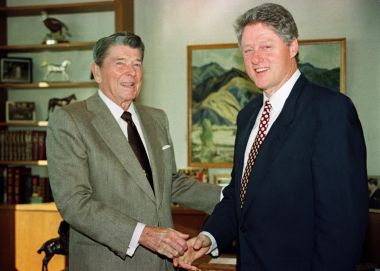The non-apology: why it's corroding our public life
It's a sad, sad situation and it's getting more and more absurd. It's sad, so sad. Why can't we talk it over?

If you're wondering why my opening line here is familiar, that's because it's not my line. It's Elton John's. In one of his most famous lyrics, he goes on to say, "Oh it seems to me, that sorry seems to be the hardest word."
He's right of course. We all know how difficult it can be to apologise when we've done something wrong. Even if we didn't mean harm, saying sorry leaves us vulnerable. Yet, it's essential. Without apologising, breakdown in human relationships would be so much more common than it already is. On a bigger level, without apology, wounds which have run deep for generations are so much harder to heal. Think of the truth and reconciliation process in South Africa or the remarkable grace in the face of obscene racist violence demonstrated time and again in the Southern United States.
These brave examples of forgiveness make it all the more remarkable that one of the most common forms of apology in the 21st Century is actually the non-apology. You know the kind of thing. Rather than saying, "Sorry I did something wrong," a politician or celebrity will say, "I'm sorry for any offence caused."
There are variations on this theme, "Sorry that what I intended didn't happen," "Sorry that you had to find out this way," "Sorry that the reaction has been worse than I anticipated."
None of these are actually apologies for the action that took place. They're apologies for the way people reacted to the action or the circumstances surrounding the action. This is such a well-established performance that it now serves to highlight what's missing from such a statement – namely a recognition that something wrong was done and that there is contrition over the event itself – not just that the person is sad they got caught.
The latest example came from David Cameron. During Prime Minister's Questions he accused a Muslim leader from south London of being a supporter of Islamic State. Cameron said, "Suliman Gani. The honorable member for Tooting has appeared on a platform with him nine times. This man supports IS."
When it became clear that Gani hadn't publicly done any such thing thing, the Prime Minister's spokesperson issued an apology. "The Prime Minister was referring to reports that he supports an Islamic state. The Prime Minister is clear this does not mean Mr Gani supports the organisation Daesh and he apologises to him for any misunderstanding."
Spot the non-apology? The Prime Minister apologises for any misunderstanding – as if it was those of us who heard his words and misunderstood them that were to blame for the error. Except we didn't misunderstand his words. We understood them perfectly well. Cameron accused Gani of being a supporter of IS and as far as we can tell, he isn't – in fact he has denied it.
Cameron is just the latest in a long line of non-apology issuers. Johnny Depp and Amber Heard recorded a bizarre video apology in which they used sincere words to apologise for bringing their dogs into Australia illegally. Their faces told another story, though. In fact, this week, Depp made fun of his own apology.
That's a relatively minor case. But the non-apology has a long track record. NPR has listed the development of one of the most famous non-apology phrases – "mistakes were made." Beginning with Ulysses S Grant in 1876, it has been used by Presidents of both parties in the aftermath of major errors.
Nixon used it after Watergate, Reagan said it after the disgraceful Iran-Contra affair, while Bill Clinton was also recorded as saying it during one of his numerous periods of contrition.
The non-apology is such a familiar trope in popular discussion that it's even spawned a mocking hashtag on Twitter - #SorryNotSorry. Checking out the tag reveals people doing something they're really not sorry about. That's the effect of the non-apology. It really functions to tell us that the person issuing it isn't actually sorry for what they've done at all.
Seth Myers has had enough of it. The comedian blasted non-apologists, including John Kasich and Hillary Clinton recently:
Non-apologies debase public debate. They strip an apology of all its meaning and worth – a way of weaseling out of something that's been done wrong. It doesn't sit well with us in the UK and the USA because we don't expect our public figures to be perfect, but we do want them to be sincere when they're wrong. In fact we need them to be, if we're to trust them in the future.
In a piece for the LA Times, Brendan Tapley draws on the Judeo Christian heritage of the two countries to explain why we despise a non-apology. "After all, the Jewish faith devotes one of its high holy days to atonement (Yom Kippur), and for Christians, Jesus Christ is best emulated through the sacrament of reconciliation, which hinges on the act of confession and asking for forgiveness." It's time our leaders remembered that, and acted accordingly. They could start with an apology for all the non apologies...











